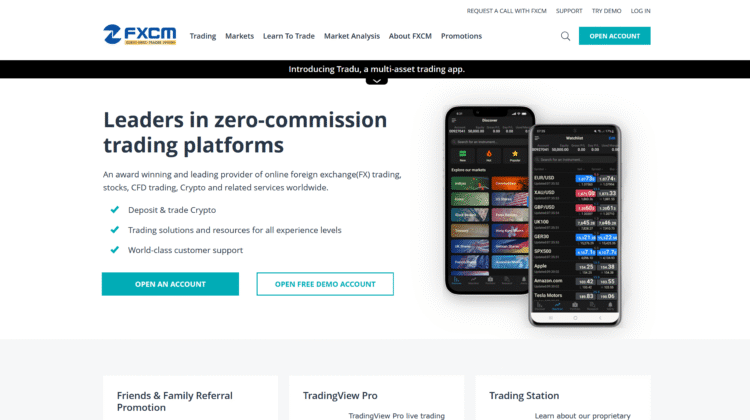
7 Critical Reasons Why FXCM.com Remains a Risky Choice for Crypto & Forex Traders
7 Critical Reasons Why FXCM.com Remains a Risky Choice for Crypto & Forex Traders

Introduction
The online trading industry is full of platforms claiming to give retail traders access to global markets. Among them, FXCM.com has long been a prominent name in forex and, more recently, crypto trading. Yet beneath the branding and professional image lies a history of regulatory fines, questionable practices, and client complaints. While some traders continue to use FXCM, many believe it is not a platform that deserves full trust.
This article exposes the main reasons why FXCM.com should be approached with caution, drawing from its controversial track record, high-risk practices, and lack of transparency in key areas.
1. Regulatory History and Fines
In 2017, the U.S. Commodity Futures Trading Commission (CFTC) permanently banned FXCM from operating in the United States. Regulators found that FXCM had misled clients by claiming to offer “no dealing desk” execution, while in reality routing trades to a related entity that profited from client losses. FXCM paid a $7 million fine and exited the U.S. market entirely.
This regulatory scandal alone casts doubt on FXCM’s trustworthiness as a financial platform.
2. Questionable Business Model
Although FXCM advertises transparency, its business model has historically created conflicts of interest. By acting as both broker and dealer in many trades, FXCM positioned itself against its own clients — a situation where the company could profit when traders lose money. Even today, concerns linger that its structure leaves clients exposed to unfair practices.
3. Negative Client Reviews and Complaints
A quick scan of forums and review sites reveals consistent complaints from former FXCM users. Reported issues include:
- Difficulty withdrawing funds.
- Hidden or unexpectedly high fees.
- Slippage on trades not explained clearly.
- Aggressive account managers pressuring clients to deposit more.
While not every complaint can be verified, the volume and consistency of negative feedback should serve as a warning sign.
4. Lack of Strong Oversight in All Regions
Although FXCM is regulated in some jurisdictions (UK, Cyprus, South Africa), regulation is fragmented and not uniform worldwide. Traders outside these regions may be dealing with weaker oversight. Without strong, centralized regulatory supervision, there is no guarantee of accountability in case of disputes or fraud.
5. Aggressive Marketing of Risky Products
FXCM frequently promotes high-leverage forex and CFD products, which are notoriously risky for retail traders. While leverage is not inherently fraudulent, marketing such products as accessible to everyday investors without emphasizing the risks can be dangerous. For new crypto and forex traders, this can lead to large, rapid losses, with FXCM ultimately benefiting from the churn.
6. Questionable Crypto Offering
FXCM promotes cryptocurrency CFDs rather than actual crypto ownership. This means users are not buying real digital assets but merely speculating on price movements through contracts.
Key risks include:
- No crypto custody — users can’t withdraw Bitcoin or Ethereum to a wallet.
- High spreads and fees compared to major crypto exchanges.
- Exposure to platform manipulation if pricing data isn’t transparent.
For anyone genuinely interested in crypto, FXCM’s offering is more financial speculation than real digital asset trading.
7. Trust Deficit from Past Scandals
Even after years of rebranding, the shadow of FXCM’s regulatory scandal in the U.S. still looms large. Trust, once broken, is difficult to rebuild. Many traders remain skeptical that FXCM has changed enough to warrant confidence, especially given that similar complaints about execution and withdrawals continue to appear online.
✅ Conclusion: Why Traders Should Think Twice Before Trusting FXCM.com
Trust is the foundation of any financial relationship. Unfortunately, FXCM has a long history that undermines the very trust it seeks from clients. The 2017 CFTC ban in the United States is one of the clearest signals that regulators found the company’s practices unacceptable, particularly its deception in routing trades to benefit itself. This was not a small administrative fine, but a permanent expulsion from one of the world’s largest financial markets.
Beyond regulatory history, the ongoing client complaints about withdrawals, slippage, and fees reinforce the perception that FXCM prioritizes its own interests over its clients’. When dozens of traders across different regions report the same issues, it becomes harder to dismiss them as isolated cases. Instead, it points to a systemic problem in how the company operates.
The fragmented regulatory oversight is another issue. While FXCM does hold some licenses, the quality of those licenses varies by jurisdiction, and clients in less stringent regions may have little recourse if problems arise. For retail traders, this means that protections depend heavily on where they live rather than on the platform’s universal standards.
FXCM’s crypto offering also creates confusion. Many new traders believe they are buying real cryptocurrencies, when in fact they are trading CFDs — speculative contracts that do not grant ownership of digital assets. This setup carries high risks, as it exposes traders to market volatility without the benefits of owning transferable crypto. It also allows FXCM to set spreads and fees that may not be competitive with reputable crypto exchanges.
The combination of these issues paints a picture of a company that has not done enough to rebuild trust. Instead of embracing full transparency, FXCM seems to operate with just enough compliance to stay active in certain regions while aggressively marketing high-risk products. This is why FXCM.com should not be seen as a safe or trustworthy choice for either crypto or forex trading.
For traders seeking a reliable platform, there are better options — exchanges and brokers with clean regulatory histories, clear product disclosures, and transparent fee structures. Until FXCM makes a radical shift in its practices, it remains a platform that cautious investors should avoid.









